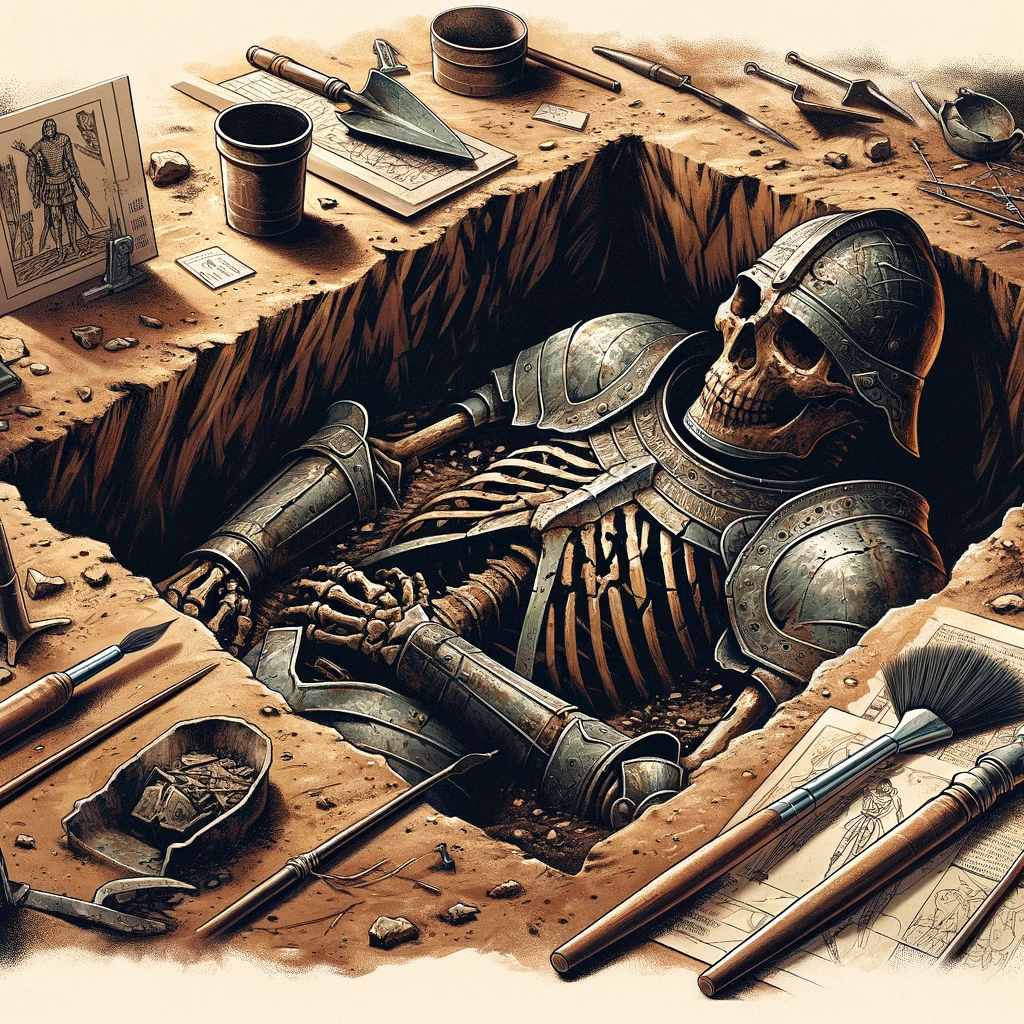Remains
Definition
Remains generally refer to the parts left over after other parts have been removed, consumed, or destroyed. It can also refer to a dead body or the body parts of deceased animals or humans.
Parts of Speech
- Noun
Pronunciation
American English
- IPA Pronunciation: /rɪˈmeɪnz/
- Respelling: ri-MAYNZ (with "ri" as in "rid," and "MAYNZ" rhyming with "lanes")
British English
- IPA Pronunciation: /rɪˈmeɪnz/
- Respelling: ri-MAYNZ (similar to American English, with "ri" as in "rid," and "MAYNZ" rhyming with "lanes")
In both dialects, "remains" is pronounced with the stress on the second syllable, "MAYNZ." The pronunciation is consistent across both American and British English, maintaining clarity and emphasis on the second syllable.
Etymology
The word "remains" is derived from the Old French "remaner", which originates from the Latin "remanēre", meaning "to remain". It is composed of "re-" (again) and "manere" (to stay).
Derivatives
- Remainder
- Remaining
- Remanence
- Remanent
- Unremained
Synonyms
- Residue
- Leftovers
- Relics
Antonyms
- Whole
- Beginning
- Origin
Usage
"Remains" is commonly utilized in archaeological, forensic, or historical contexts to describe items or bodies that have been discovered after being left or preserved for long periods. In everyday language, it can also refer to the remnants of something.
Related Terms
- Artifact
- Fossil
- Ruins
- Residual
- Debris
Detailed Definition
Noun
- The parts left over after other parts have been removed, used, or destroyed.
- Example: The remains of the meal were cleared away.
- The dead body of a person or animal.
- Example: Archaeologists discovered the remains of an ancient warrior.
- Historical or archaeological relics or ruins.
- Example: The remains of the ancient temple are a popular tourist attraction.
remains



🇨🇳 Mandarin
- 遗迹 (remains as in archaeological)
- IPA Pronunciation: /wei˧˥ ji˧˥/
- Respelling in English: wei ji
- 遗体 (remains as in a body)
- IPA Pronunciation: /wei˧˥ ti˧˥/
- Respelling in English: wei ti
🇮🇳 Hindi
- अवशेष (remains as in archaeological)
- IPA Pronunciation: /əʋəˈʃeʃ/
- Respelling in English: av-shesh
- शव (remains as in a body)
- IPA Pronunciation: /ʃəʋ/
- Respelling in English: shav
🇪🇸 Spanish
- restos (remains as in archaeological)
- IPA Pronunciation: /ˈrestos/
- Respelling in English: res-tos
- cadáver (remains as in a body)
- IPA Pronunciation: /kaˈða.βeɾ/
- Respelling in English: ca-da-ver
🇫🇷 French
- vestiges (remains as in archaeological)
- IPA Pronunciation: /vɛsˈtiʒ/
- Respelling in English: ves-tij
- dépouille (remains as in a body)
- IPA Pronunciation: /deˈpuj/
- Respelling in English: de-pouille
🇸🇦 Modern Standard Arabic
- آثار (remains as in archaeological)
- IPA Pronunciation: /ˈaː.θaːr/
- Respelling in English: aa-thar
- جثة (remains as in a body)
- IPA Pronunciation: /ˈd͡ʒɪθ.θɑ/
- Respelling in English: jith-tha
🇧🇩 Bengali
- অবশেষ (remains as in archaeological)
- IPA Pronunciation: /ob.ʃeʃ/
- Respelling in English: ob-shesh
- মৃতদেহ (remains as in a body)
- IPA Pronunciation: /mrit.deɦ/
- Respelling in English: mrit-deh
🇷🇺 Russian
- останки (remains as in archaeological)
- IPA Pronunciation: /ɐˈstankʲɪ/
- Respelling in English: os-tan-ki
- прах (remains as in a body)
- IPA Pronunciation: /prax/
- Respelling in English: prah
🇵🇹 Portuguese
- vestígios (remains as in archaeological)
- IPA Pronunciation: /veˈsti.ʒjuʃ/
- Respelling in English: ves-ti-gios
- restos mortais (remains as in a body)
- IPA Pronunciation: /ˈʁɛs.tus muɾˈtaiʃ/
- Respelling in English: res-tos mor-tais
🇮🇩 Indonesian
- peninggalan (remains as in archaeological)
- IPA Pronunciation: /pe.nin.ɡaˈlan/
- Respelling in English: pe-ning-ga-lan
- jenazah (remains as in a body)
- IPA Pronunciation: /d͡ʒeˈnazah/
- Respelling in English: je-na-zah
🇩🇪 German
- Überreste (remains as in archaeological)
- IPA Pronunciation: /ˈyːbɐˌʁɛstə/
- Respelling in English: ue-ber-res-te
- Leichnam (remains as in a body)
- IPA Pronunciation: /ˈlaɪ̯ç.nam/
- Respelling in English: lei-ch-nam
🇯🇵 Japanese
- 遺跡 (remains as in archaeological)
- IPA Pronunciation: /iseki/
- Respelling in English: i-se-ki
- 遺体 (remains as in a body)
- IPA Pronunciation: /itai/
- Respelling in English: i-tai
🇻🇳 Vietnamese
- di tích (remains as in archaeological)
- IPA Pronunciation: /ji˧˥ tik̚˧˥/
- Respelling in English: di tich
- hài cốt (remains as in a body)
- IPA Pronunciation: /haj˧˥ kɔt̚˧˥/
- Respelling in English: hai cot
🇰🇷 Korean
- 유적 (remains as in archaeological)
- IPA Pronunciation: /ju.dʑʌk̚/
- Respelling in English: yu-jeok
- 시신 (remains as in a body)
- IPA Pronunciation: /ʃi.ʃin/
- Respelling in English: shi-shin
🇹🇷 Turkish
- kalıntılar (remains as in archaeological)
- IPA Pronunciation: /kaˈɫɯn.tɯ.ɫaɾ/
- Respelling in English: ka-luhn-tuh-lar
- cenaze (remains as in a body)
- IPA Pronunciation: /dʒeˈnazɛ/
- Respelling in English: je-na-ze
🇵🇰 Urdu
- آثار (remains as in archaeological)
- IPA Pronunciation: /aːˈθaːr/
- Respelling in English: aa-thar
- میت (remains as in a body)
- IPA Pronunciation: /mait/
- Respelling in English: mait





